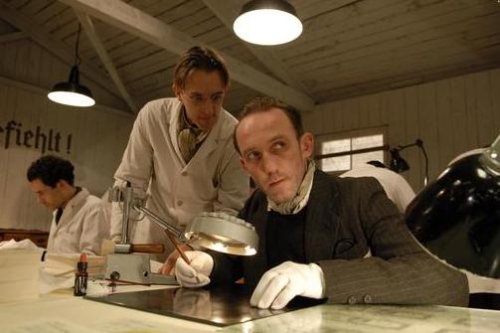Do Holocaust Movies Help Or Hinder Our Understanding?
Posted on December 28, 2008 at 8:00 am
Stuart Klawans, movie critic for The Nation for 20 years, has written a provocative essay about Holocaust movies for the website Nextbook.
Like so many other Jews, I have made my contribution toward the multiplication of Holocaust films. On New Year’s Eve 1985, I chose to spend my money at a movie theater, watching Part One of Shoah. A few years later, when asked in the wake of Schindler’s List
how many more Holocaust films the world needed, I snapped, “We can stop at six million.”
But now, some dozen years and perhaps hundreds of movies later–in a season swollen with no fewer than six such releases–I respectfully request a moratorium on Holocaust films. By continually replaying and reframing and reinventing the past, these movies are starting to cloud the very history they claim to commemorate. Call it the law of diminishing returns–or call it a paradox that mirrors the Torah’s famously self-contradictory commandment at the end of Parshat Ki Tetze, concerning the people who were the prototype of Nazi Germany: “Thou shalt blot out the remembrance of Amalek from under heaven; thou shalt not forget.” Very soon, with Holocaust movies, we’ll need to forget if we want to remember.
This issue has been on my mind as well. While others on Beliefnet have written approvingly about the recent film “The Boy in Striped Pajamas,” I found it to be superficial and manipulative. A lot of WWII movies are. As our world is increasingly troubling and complex, it is too easy to return to the Holocaust and portray Nazis as the last unambiguously evil villains, and just as important, unambiguously defeated. And yet, the very magnitude of the Holocaust requires a mosaic of stories for us to understand it even imperfectly.
According to Klawans, the number of Holocaust-related films is increasing as the few left who were there to witness it are dying out. He describes a recent screening of the upcoming film “Defiance,” based on the true story of The Bielski Partisans, three brothers who hid more than 1000 Jews from the Nazis. But it seems to me he makes a powerful point against his argument when he describes the reaction of the audience.
This audience, with its special moral authority, clearly did not care that the true story of the Bielski brothers was being filtered through calculated performances, invented speeches, dramatic conventions, and cinematographic effects. What mattered to them, as people irrevocably claimed by these events, was that their past was real, and so was the movie that acknowledged it.
This alone is a valid enough reason to make movies about the Holocaust, to reassure the survivors who saw so many stories lost forever that at least their stories will be told. We will not ever know all the more than six million stories of the Holocaust, but each succeeding generation has something to learn from the moral failings and moral triumphs of the era. That may not always mean dramatic re-enactments, however. The Holocaust movie I have found most insightful and affecting in recent years is Paper Clips, a touching documentary about a Holocaust curriculum in an almost all-white, all-Christian elementary school.

